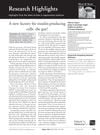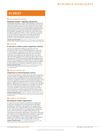 7 citations,
July 2012 in “Regenerative Medicine”
7 citations,
July 2012 in “Regenerative Medicine” New treatments for diabetes, central nervous system repair, and cartilage injury were found, and a way to create functional hair follicles from stem cells was developed.
 6 citations,
May 2023 in “European journal of pharmaceutical sciences”
6 citations,
May 2023 in “European journal of pharmaceutical sciences” Niosomes are the most effective at delivering drugs to the skin with minimal absorption into the body.
 5 citations,
January 2014 in “Current Dermatology Reports”
5 citations,
January 2014 in “Current Dermatology Reports” Many adult women suffer from persistent or late-onset acne, and while various treatments exist, finding the right one can be challenging.
 5 citations,
September 2012 in “Springer eBooks”
5 citations,
September 2012 in “Springer eBooks” Nanoparticles can be used to deliver drugs to hair follicles, potentially improving treatments for conditions like acne and alopecia, and could also be used for vaccine delivery and gene therapy.
 4 citations,
September 2011 in “Expert Review of Dermatology”
4 citations,
September 2011 in “Expert Review of Dermatology” Various treatments exist for alopecia areata, but none are completely satisfactory; choice depends on age, disease extent, and preference.

New treatments for vitiligo may focus on protecting melanocyte stem cells from stress and targeting specific pathways involved in the condition.
 2 citations,
October 2022 in “Current Dermatology Reports”
2 citations,
October 2022 in “Current Dermatology Reports” People on immune-modifying skin disease treatments may have a weaker antibody response to COVID-19 vaccines but often improve after the second dose.
 2 citations,
March 2015 in “Expert opinion on orphan drugs”
2 citations,
March 2015 in “Expert opinion on orphan drugs” New treatments for hair loss show promise but need more research to confirm safety and effectiveness.
 December 2024 in “International Ayurvedic Medical Journal”
December 2024 in “International Ayurvedic Medical Journal” Ayurvedic treatments may help reduce hypothyroidism symptoms.
 August 2024 in “Frontiers in Pharmacology”
August 2024 in “Frontiers in Pharmacology” Antibody treatments show promise for hair loss but need more research.
July 2024 in “Journal of Controlled Release” Nanostructured lipid carriers effectively deliver tofacitinib to hair follicles, reversing hair loss in alopecia areata.
June 2024 in “Ecotoxicology and Environmental Safety” Finasteride harms Daphnia magna's reproduction, growth, and metabolism.
 February 2024 in “Journal of Education, Health and Sport”
February 2024 in “Journal of Education, Health and Sport” Different treatments for PCOS should be tailored to the individual, including lifestyle changes and various medications.
 December 2023 in “Migration letters”
December 2023 in “Migration letters” Herbal treatments can help manage PCOS symptoms.
 November 2023 in “Frontiers in pharmacology”
November 2023 in “Frontiers in pharmacology” Drug repositioning offers hope for new, affordable treatments for a genetic skin disorder called ARCI.
 October 2020 in “Veterinary Dermatology”
October 2020 in “Veterinary Dermatology” New treatments and diagnostic methods for various animal skin conditions showed promising results.
 November 2017 in “Elsevier eBooks”
November 2017 in “Elsevier eBooks” PCOS is a genetic disorder affecting women's reproductive health, with treatments focused on symptoms like insulin resistance and fertility.
 August 2015 in “Free Radical Biology and Medicine”
August 2015 in “Free Radical Biology and Medicine” Some treatments can improve skin's defense against damage, but overuse may cause other skin problems.

Hormonal treatments can help with hair loss, acne, and excess hair growth, but it takes 3-6 months to see results and patients should know the possible side effects.
 August 2013 in “Nature Reviews Drug Discovery”
August 2013 in “Nature Reviews Drug Discovery” New cancer treatments show promise in reducing tumor growth and improving skin regeneration in mice.
 October 2003 in “Journal of Investigative Dermatology Symposium Proceedings”
October 2003 in “Journal of Investigative Dermatology Symposium Proceedings” Mice treatments didn't grow hair, a patient treatment may affect immune response, and people with hair loss often feel anxious or depressed.
 January 1998 in “Lasers in Surgery and Medicine”
January 1998 in “Lasers in Surgery and Medicine” Lasers are effective and safe for various medical treatments, including cancer, wound healing, and skin conditions.
 September 1995 in “American Journal of Contact Dermatitis”
September 1995 in “American Journal of Contact Dermatitis” Antiyeast treatments work better for seborrheic dermatitis than steroids, and other findings include increased skin bacteria under plastic wrap, a nasal cell defect in Staphylococcus aureus carriers, quick resolution of certain skin reactions, high rubber latex allergy in spina bifida patients, and glyceryl monopentadecanoate's effectiveness for male hair loss.
 April 1981 in “Pediatric research”
April 1981 in “Pediatric research” Copper treatments increase copper in all tissues, but brindled female mice accumulate much more copper in their kidneys without clinical effects, unlike brindled male mice where brain copper deficiency is clinically significant.
 2295 citations,
August 2012 in “The international journal of transgenderism/International journal of transgenderism”
2295 citations,
August 2012 in “The international journal of transgenderism/International journal of transgenderism” The guidelines recommend informed consent for gender-affirming treatments and stress the importance of personalized, culturally sensitive care for transgender individuals.
 1160 citations,
November 2018 in “Physiological Reviews”
1160 citations,
November 2018 in “Physiological Reviews” The document concludes that better targeted treatments are needed for wound healing, and single-cell technologies may improve cell-based therapies.
 280 citations,
July 2018 in “Antioxidants”
280 citations,
July 2018 in “Antioxidants” Treatments that reduce oxidative stress and fix mitochondrial problems may help heal chronic wounds.
 67 citations,
February 2015 in “Life Sciences”
67 citations,
February 2015 in “Life Sciences” Some plant-based treatments can help with benign prostatic hyperplasia symptoms, but more research is needed to confirm their safety and effectiveness.
 56 citations,
April 2003 in “Fertility and Sterility”
56 citations,
April 2003 in “Fertility and Sterility” All three treatments reduce hirsutism, but spironolactone works best long-term.
 38 citations,
October 1996 in “Dermatologic Clinics”
38 citations,
October 1996 in “Dermatologic Clinics” Certain hormone treatments can improve acne and related conditions in women.




























